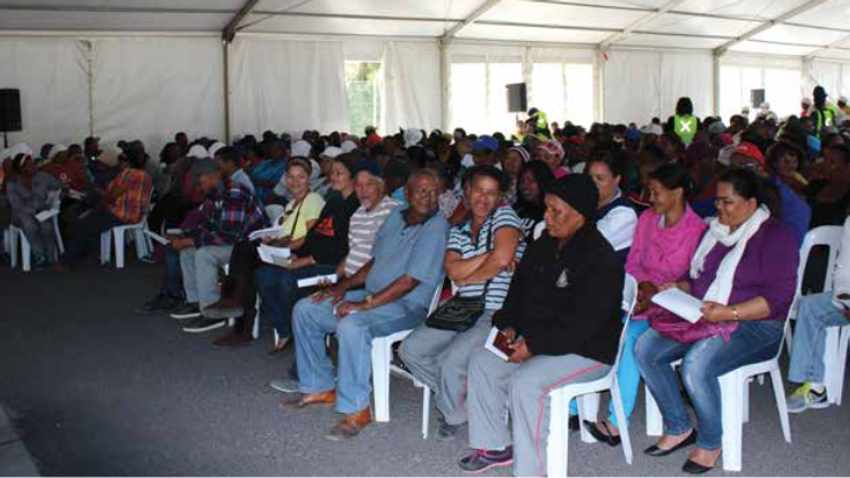Cape Town – Black employee beneficiaries of the Oceana Empowerment Trust say they are laying charges against the fund’s trustees after they allegedly registered and transferred the employee’s shares to themselves as the “beneficial owners” of all employee beneficiary shares.
In a letter to the fund’s executive, which Independent Media has seen, a beneficiary expressed her disgust about the treatment of black beneficiaries, questioning why changes were made without their consent and knowledge.
The Trust, which holds 10.3% in shares at Oceana, has more than 2 400 eligible beneficiaries who include current and former employees.
“The majority of the beneficiaries are still not aware of this illegal transaction. In their minds they are still shareholders, when in actuality they are not,” she explained.
The beneficiary regards the act as fraud and said the trustees had blatantly disregarded them as black shareholders, depriving them of their rights.
“They failed to give us copies of the original and amended Trust Deed and other legal documents associated with Oceana Empowerment Trust upon requests.”
She said amendments were made to the Oceana Empowerment Trust Trust Deed in February 2014, but had not been provided to beneficiaries because they had not consented and had no knowledge of the specific amendments made.
“Clauses were inserted which allowed them to transfer the employee beneficiaries shares to the trustees as the registered and beneficial owners and for the selling of shares, among others.
“This means beneficiaries do not have rights over the shares, as the trustees are the rightful owners. Once the shares are sold, the trustees will first make payment to Oceana, pay relevant taxes and expenses, before transferring the remaining balance into the beneficiaries’ account.”
She believes Oceana, a top seafood company, used black beneficiaries to secure government contracts for the benefit of themselves.
“There are no real benefits for black people in Oceana, as the majority of the beneficiaries that were, and still are, employed by Oceana had waited years to reap the benefits of their hard work.
“The trustees also misrepresented to the beneficiaries in 2013 with a clear intention of fraud, inducing them into an agreement to extend the lock-in period using a payout of R100 000 as an incentive.”
The trustees allegedly informed the beneficiaries at Oceana Empowerment Trust’s AGM, held in St Helena’s Bay in November 2013, that if they did not agree to the extension they would not become eligible for the payout.
“This is bribery and corruption. The trustees misled the beneficiaries into believing they would be making the right decisions, and encouraged them to vote in favour of the lock-in period.
“Trustees failed to explain to the beneficiaries the consequences and implications the votes would have on the capital share value at the end of the lock-in period.”
She added that employees were laying charges of corruption against the trustees who failed to preserve their shares, intentionally exposing them to risks.
A 2014 Oceana Empowerment Trust report stated that a voting process took place in St Helena Bay before amendments were made to the Trust Deed, and 2 027 votes were cast, of which 2 001 beneficiaries voted in favour of the proposal.
However, in the same report, Oceana Empowerment Trust confirmed twice that employee beneficiaries “had voted in a marquee set up, seating at least 1 000 people”, which brings Independent Media to question the accuracy of the number of beneficiaries who voted in favour of the changes on the day.
Oceana’s media liaison, Tiana Fataar, said it was a small group of black employee beneficiaries who did not understand the Trust Deed.
Oceana spokesperson and chairman of Oceana Empowerment Trust, Jayesh Jaga, said the trustees dismissed all claims of impropriety as baseless, without merit, and had engaged with the beneficiary, providing her access to all relevant documents.
“This process is on-going to provide facts and clarity as required by the beneficiary,” Jaga said.
He said Oceana Empowerment Trust was established to create shared, broad-based value for eligible black employees by allowing them to become financially empowered and active participants in South Africa’s formal economy.
“The Oceana Empowerment Trust has issued this to qualifying beneficiaries, on a voluntary basis, with participatory rights, at no cost, and over the years distributed dividends and early pay-outs amounting to around R477 million before tax, impacting the lives of over 2 400 beneficiaries.”
He said that from 2013 to 2014, a material amendment to the Trust was made that provided for the extension of the lock-in period with a vesting date for January 2021, the payment of a meaningful advance pay-out, and a beneficial change to increasing the number of dividend distributions beneficiaries would receive in the future for their participatory rights.
“Before securing the beneficiary agreement, the trustees embarked on a roadshow throughout the country. Twenty sessions reached over 2 000 people.
“A detailed letter was sent to all beneficiaries, advising them of the meeting to vote on the proposed amendments and how the Trust deed would change if the proposal was accepted.
“At the meetings, the trustees handed out a booklet explaining what the amendment meant and its consequences. Through this open engagement process, an overwhelming majority of beneficiaries supported the amendments.”
He denied that the trustees fraudulently transferred the shares to themselves, or failed to preserve the beneficiaries’ shares, as alleged.
“There is no illegal transaction carried out without the knowledge or consent of beneficiaries. Any assertions in this regard are unfounded and appear to be driven by malicious intent.”
He added that the Trust deed was always available to be inspected by beneficiaries, at their request, and denied that trustees had kept it from the beneficiaries.
aishah.cassiem@inl.co.za
Investigations Unit


















